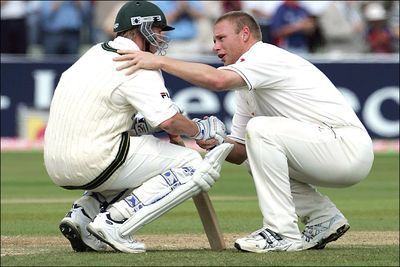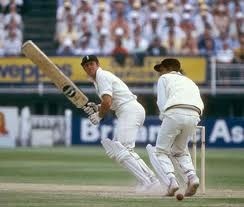All for one and one for all
By ADRIAN TAHOURDIN
"It’s 1–1 mate.” Those were the words the England
all-rounder Andrew Flintoff apparently uttered to the Australian fast bowler Brett
Lee immediately after England had won the second Test at Edgbaston in August
2005, in what has become an iconic image of sportsmanship (above). Australia
had blown England away in the first Test at Lords and many of us feared the
prospect of a horribly one-sided series, with the greatest Test team of the
modern era effortlessly demonstrating its vast superiority once again.
That’s not how it turned out of course. At the end
of five acts of nerve-shredding drama England emerged victorious, just. The 2–1 margin doesn’t begin to suggest how close the series was. As Flintoff reminded
listeners to BBC Radio Five Live last week in the wonderfully entertaining
first 90-minute instalment of an Ashes retrospective, if the spearhead of the
Australian bowling attack Glenn McGrath hadn’t injured himself by accidentally
treading on a cricket ball just before the start of the second Test (and
thereby missing two matches), Australia would probably have won. Luck played a
big part in England’s triumph.
For the programme the Lancastrian Flintoff brought
together the three other members of England’s fast bowling attack: Stephen
Harmison, Matthew Hoggard and Simon Jones. Harmison the gangling and
occasionally lethal giant from Durham, Hoggard the bluff Yorkshireman and
workhorse, and Jones the Welsh pin-up with a devastating line in reverse swing.
Like a gang of gunslingers reliving their finest hour, the quartet were quick
to pay tribute to each other’s achievements, to praise the nerveless captaincy
of the remarkable Michael Vaughan, and to give credit to the fifth member of
the bowling attack, the dependable (and occasionally brilliant) off-spinner
Ashley Giles (affectionately known as the “King of Spain”). Together they
managed to get the better of one of the most illustrious batting line-ups in
history, the great Adam Gilchrist’s vulnerability to Flintoff’s aggression a
particularly notable success.
It was almost moving to hear how much genuine
pleasure they seemed to take at the time in each other’s success: cricket is a
team game in which individual achievement counts for everything, but here was a
case of “all for one and one for all”: when Simon Jones broke down halfway
through the fourth Test at Trent Bridge he felt he had let his fellow bowlers
down; they, on the other hand, were mortified that he wasn’t able to share in ultimate victory. As
it turned out, the injury was so serious that Jones had just played his last
Test, an international career largely unfulfilled.
But what a summer the quartet had: Flintoff touched
cricketing greatness as a bowler and batsman for those intense six weeks,
Harmison was frequently hostile, Hoggard belied his workhorse reputation by
regularly making inroads into Australia’s top order and Jones was, on his day,
simply unplayable. In a low-scoring series, only three Australian batsmen made
a century (England managed five). Shane Warne was of course immense, but even he
couldn’t carry the Australians to victory on his own.
It seemed, by the end of the summer, as though
Vaughan’s team were on the brink of cricketing greatness. Sadly, injuries took
their toll, not least with Vaughan himself. Flintoff never reached those heights again, while Harmison’s
fragile confidence was ruthlessly exposed by the Australians in their home
series 18 months later – a shocker which they won 5-0. Hoggard was unceremoniously
dropped. Sporting careers, it seems, are, like political careers, too often
destined to end in failure (remember how the great Ian Botham limped on for
five years after he should have retired from international cricket?).
In a second instalment this week Flintoff revealed a
surprising admiration and affection for the Yorkshire colossus Geoffrey Boycott –
a rare Red and White Rose mutual admiration society (Flintoff’s public spats
with his fellow Lancastrian Michael Atherton, on the other hand, have been
rather unseemly). The two could not have had more contrasting approaches to the
game, Flintoff barn-storming to the point of recklessness and Boycott (below – what a long bat he seems to be wielding!) self-absorbed to the occasional detriment of the team, but utterly dedicated; it was fascinating
to hear such appreciation of each other’s approach.
All this is part of the build-up to this summer’s
Ashes series, which opens on July 10. England are favourites, a position they
are not always comfortable with. Just one small footnote: the Australian selectors
have omitted Mitchell Johnson, their mercurial “once in a generation” bowler.
This is baffling as, by my reckoning, in two Ashes series Johnson has almost singlehandedly won two
Tests with his bowling. Will they come to regret it?
Peter Stothard's Blog
- Peter Stothard's profile
- 30 followers





